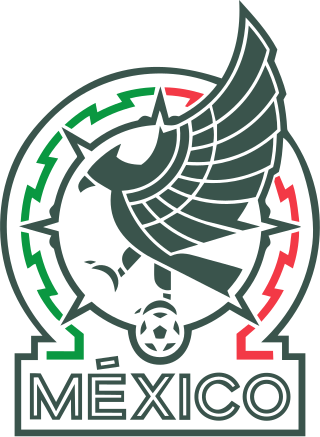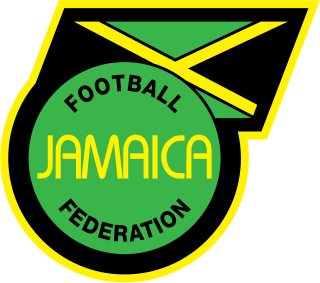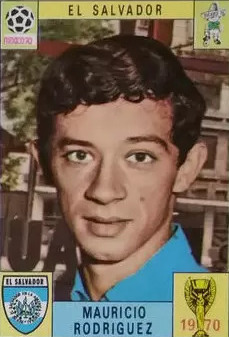
The Canada men's national soccer team represents Canada in international soccer competitions since 1924. They are overseen by the Canadian Soccer Association, the governing body for soccer in Canada. They have been a member of FIFA since 1948 and a member of CONCACAF since 1961.

The Mexico national football team represents Mexico in international football and is governed by the Mexican Football Federation. It competes as a member of CONCACAF.
Eliseo Antonio Quintanilla Ortíz is a former Salvadoran professional footballer.

The Honduras national football team represents Honduras in men's international football. The team is governed by the Federación Nacional Autónoma de Fútbol de Honduras. They are nicknamed Los Catrachos, La Bicolor, or La H.

The Costa Rica national football team represents Costa Rica in men's international football. The national team is administered by the Costa Rican Football Federation (FEDEFUTBOL), the governing body for football in Costa Rica. It has been a member of the Fédération Internationale de Football Association (FIFA) since 1927, the Confederation of North, Central American and Caribbean Association Football (CONCACAF) since 1961, and a member of the Central American Football Union (UNCAF) since 1990.

The Jamaica national football team, nicknamed the "Reggae Boyz", represents Jamaica in international football. The team's first match was against Haiti in 1925. The squad is under the supervising body of the Jamaica Football Federation (JFF), which is a member of the Caribbean Football Union (CFU), Confederation of North, Central American and Caribbean Association Football (CONCACAF), and the global jurisdiction of FIFA. Jamaica's home matches have been played at Independence Park since its opening in 1962.

The El Salvador national football team represents El Salvador in international football, and is governed by the Salvadoran Football Federation (FESFUT).

The Panama national football team represents Panama in men's international football and is governed by the Panamanian Football Federation. The team represents all three FIFA, CONCACAF and the regional UNCAF.

The Belize national football team represents Belize in international football and is controlled by the Football Federation of Belize, a member of the Central American Football Union of CONCACAF.
A total of 109 teams entered the 1982 FIFA World Cup qualification rounds, which began with the preliminary qualification draw on 14 October 1979 at Zürich, competing for a total of 24 spots in the final tournament, an increase from 16 in the previous World Cups. Spain, as the hosts, and Argentina, as the defending champions, qualified automatically, leaving 22 spots open for competition.

Club Deportivo Atlético Marte, also known as Atlético Marte, is a Salvadorian association football club based in San Salvador.
Luis Baltazar Ramírez Zapata is a retired Salvadoran footballer.
Luis Alonso Anaya Merino is a Salvadoran former professional football player. He was banned for life in 2013, for match fixing while playing for the El Salvador national football team.

Mauricio Alonso "Pipo" Rodríguez Lindo is a retired footballer from El Salvador.
Ramón Alfredo Sánchez Paredes is a Salvadoran football player. He was banned for life in 2013, for match fixing while playing for the El Salvador national football team.

Hungary v El Salvador was the second game to be played in Group 3 of the first group stage at the 1982 FIFA World Cup. The game was played at Nuevo Estadio in Elche, Spain on 15 June between the men's national football teams of Hungary and El Salvador. Hungary won the match 10–1, recording the biggest scoreline in men's FIFA World Cup finals history.
The sport of football in the country of El Salvador is run by the Salvadoran Football Association. The association administers the national football team, as well as the Primera División de Fútbol de El Salvador, the top level in its league system. Football is the most popular sport in the country.
Association football is the most popular sport in almost all North, Central American and Caribbean countries, and eleven members of the Confederation of North, Central American and Caribbean Association Football, CONCACAF, have competed at the sport's biggest event – the men's FIFA World Cup.
The El Salvador–Honduras football rivalry is a sports rivalry between the El Salvador and Honduras national football teams. The rivalry between the two nations peaked in 1969 when both teams played each other in the 1970 FIFA World Cup qualifiers, and the matches they played between each other, which ultimately saw El Salvador advance to the 1970 FIFA World Cup, were a contributing factor which led to the outbreak of the Football War in July 1969.
The North, Central American and Caribbean section of the 1970 FIFA World Cup qualification acted as qualifiers for the 1970 FIFA World Cup in Mexico, for national teams which are members of the Confederation of North, Central American and Caribbean Association Football (CONCACAF). Twelve teams participated in the tournament to compete for one place in the final tournament.











